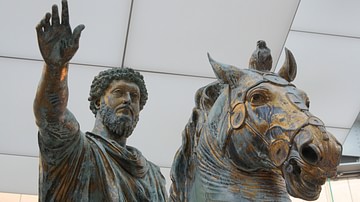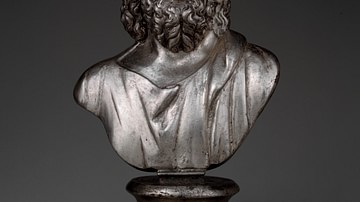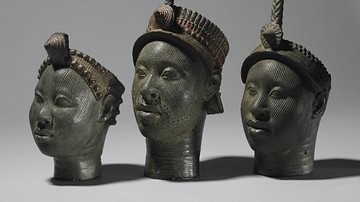Search
Did you mean: Rama?
Search Results

Definition
Roman Art
The Romans controlled such a vast empire for so long a period that a summary of the art produced in that time can only be a brief and selective one. Perhaps, though, the greatest points of distinction for Roman art are its very diversity...

Definition
Cyclops (Creature)
A cyclops (meaning 'circle-eyed') is a one-eyed giant first appearing in the mythology of ancient Greece. The Greeks believed that there was an entire race of cyclopes who lived in a faraway land without law and order. Homer, in his Iliad...

Definition
Charvaka
Charvaka (also given as Carvaka) was a philosophical school of thought, developed in India c. 600 BCE, stressing materialism as the means by which one understands and lives in the world. Materialism holds that perceivable matter is all that...

Definition
Byzantine Art
Byzantine art (4th - 15th century CE) is generally characterised by a move away from the naturalism of the Classical tradition towards the more abstract and universal, there is a definite preference for two-dimensional representations, and...

Definition
Roman Sculpture
Roman sculpture blended the idealised perfection of Classical Greek sculpture with a greater aspiration for realism. It also absorbed artistic preferences and styles from the East to create images in stone and bronze which rank among the...

Definition
Chanakya
Chanakya (l. c. 350-275 BCE, also known as Kautilya and Vishnugupta) was prime minister under the reign of Chandragupta Maurya (r. c. 321-c.297 BCE), founder of the Mauryan Empire (322-185 BCE). He is best known as the author of the political...

Definition
Typhon
Typhon (also Typheus) is the largest and most dreadful monster in Greek mythology. He was tall, with a brutish face, and had wings, countless snakeheads in place of hands, and a lower body made up of coiled serpents. His eyes flashed fire...

Definition
Serapis
Serapis is a Graeco-Egyptian god of the Ptolemaic Period (323-30 BCE) of Egypt developed by the monarch Ptolemy I Soter (r. 305-282 BCE) as part of his vision to unite his Egyptian and Greek subjects. Serapis’ cult later spread throughout...

Definition
Medea
Medea is an enchantress and the daughter of King Aeëtes of Colchis (a city on the coast of the Black Sea). In Greek mythology, she is best known for her relationship with the Greek hero Jason, which is famously told in Greek tragedy playwright...

Definition
Ife
Ife (aka Ile-Ife) was an ancient African city which flourished between the 11th and 15th century CE in what is today Nigeria in West Africa. Ife was the capital and principal religious centre of the Yoruba kingdom of Ife, which prospered...